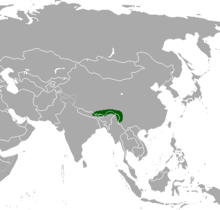Moschus fuscus
| Black musk deer | |
|---|---|
 |
|
| Scientific classification | |
| Kingdom: | Animalia |
| Phylum: | Chordata |
| Class: | Mammalia |
| Order: | Artiodactyla |
| Family: | Moschidae |
| Genus: | Moschus |
| Species: | M. fuscus |
| Binomial name | |
|
Moschus fuscus Li, 1981 |
|
 |
|
The black musk deer or dusky musk deer (Moschus fuscus) is a species of even-toed ungulate in the family Moschidae. It is found in Bhutan, China, India, Myanmar, and Nepal.
M. fuscus is, in appearance, a small deer with long, thick hind legs in comparison to the front legs, and no antlers. The dusky musk deer has large and well developed ears and eyes. Males and females are similarly sized, between 70 and 100 cm in length and 10 and 15 kg in weight, and generally have thick brown hair. There is variation in color and vibrancy, which is evident in spotting. Upper canine teeth in males form sabers that can extend past the jaw, but not in females. Unlike most cervids, this creature possesses a gallbladder and does not have the same facial glands. Mature males have a musk gland between the naval and genitalia, and females have two mammae.
Black musk deer have mating periods beginning in late November into December, lasting roughly one month. They have a polygynous mating system, mating with more than one female at a time. Breeding typically occurs in November and December. During mating season, a male excretes scents from scent glands to indicate his territory (
Gestation lasts roughly six months, ending in parturition, which normally occurs during June or July. Typically, females give birth to one or two young. The newborns weigh about 500 g, and have spots. The young are cared for by their mother after birth for several months, until weaning occurs. This process generally takes between three and four months. At six months, the young have typically reached full adult size. Sexual maturity, however, does not occur until roughly 18 months.
Not much is known about black musk deer parental care. Females are generally the main caretakers, as they watch their young for roughly 3 to 4 months. Typically, the young travel with their mothers throughout this period, during which the mother defends and grooms her young. The role of the father in parental care is currently unknown.
All animals have a certain position on the food web. Even the black musk deer, although only endangered, its lack of species numbers has a detrimental effect on the environment in which it lives and the food web in which it participates. They are believed to affect the vegetation because they consume mostly grass and other plants. Because they are hunted by humans and other animals such as the wolverine, lynx, and yellow-throated marten, their numbers have been greatly reduced, so they are now on the endangered species list. With fewer black musk deer around, it has become more difficult for these predators to find food, greatly affecting the food web.
...
Wikipedia

